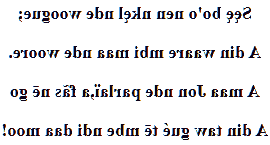Tupuri love poem
Woogue
Sęę bo'o nen nkęl nde woogue;
A din waare mbi maa nde woore.
A maa Jon nde parlaï,a fãs nē go
A din taw gué tē mbe ndi daa moo!


→ French poem ←
Tupuri language
Short Tupuri love poem (Toupouri, Tpuri, Toubouri, Ndore, Wina, Dema, Ndoore, Tpuri, Honya, Tongoyna, Mata, Tuburi, Bang-Ling, Faale-Piyew, Bang-Were, Podokge, autonym: jäāk Tüpürï, jäāk Tüpür, jäāk Tpür, Tupuro), the Adamawa language of the Northern-Mbum group, of about 350,000 people.
Tpuri is spoken by the Tupuri ethnic group in northern Cameroon (Mayo-Kani, Mayo-Danay) which is the region called "beak of a duck", as well as in southwestern Chad (Mayo-Kebbi).
There are four or five main dialect varieties (The ɓaŋ-liŋ, the ɓaŋ-gɔ, the faalë-piyew, the ɓaŋ-wεrε and the poɗɔkge), the two most important being the first two. The ɓaŋ-liŋ (from home), seems to be the dialect that has suffered the least influence from neighboring languages and the purest.
Toupouri remains a language full of vitality among the youngest; magazines present poems and stories in the language.
Tupuri people
The Tupuri are a group of different origin which would come from sudan, we distinguish at least 56 clans of which the Goua and the Doré; let us quote the three clans considered at the origin: the Baguri, the Donlonré and the Guyuri.
They are breeders (goats, sheep, gallinaceans), fishermen and farmers, and their communities are under the direction of the "wang" (the chief).
Animals, whether wild (prey) or domestic, are of great symbolic, economic and social (for obtaining a wife) importance.
Among the Tupuri the man gives cows in exchange for women, then gives his daughters in exchange for cows. This ox/woman economic circuit is an important link in Tupuri society, since the animals acquired during the marriage of a girl will very quickly be used by her brother to acquire his own wife.
The family of the married woman will always ensure that she does not leave her husband, to avoid reimbursing the compensation given at the time of the marriage. On the other hand, after a few years of marriage without children, it is possible for the married woman to find another companion who will pay the husband a compensation in cattle.
This very strong link which symbolically connects the woman and the cow is found in the language in many expressions.
Mundang poem